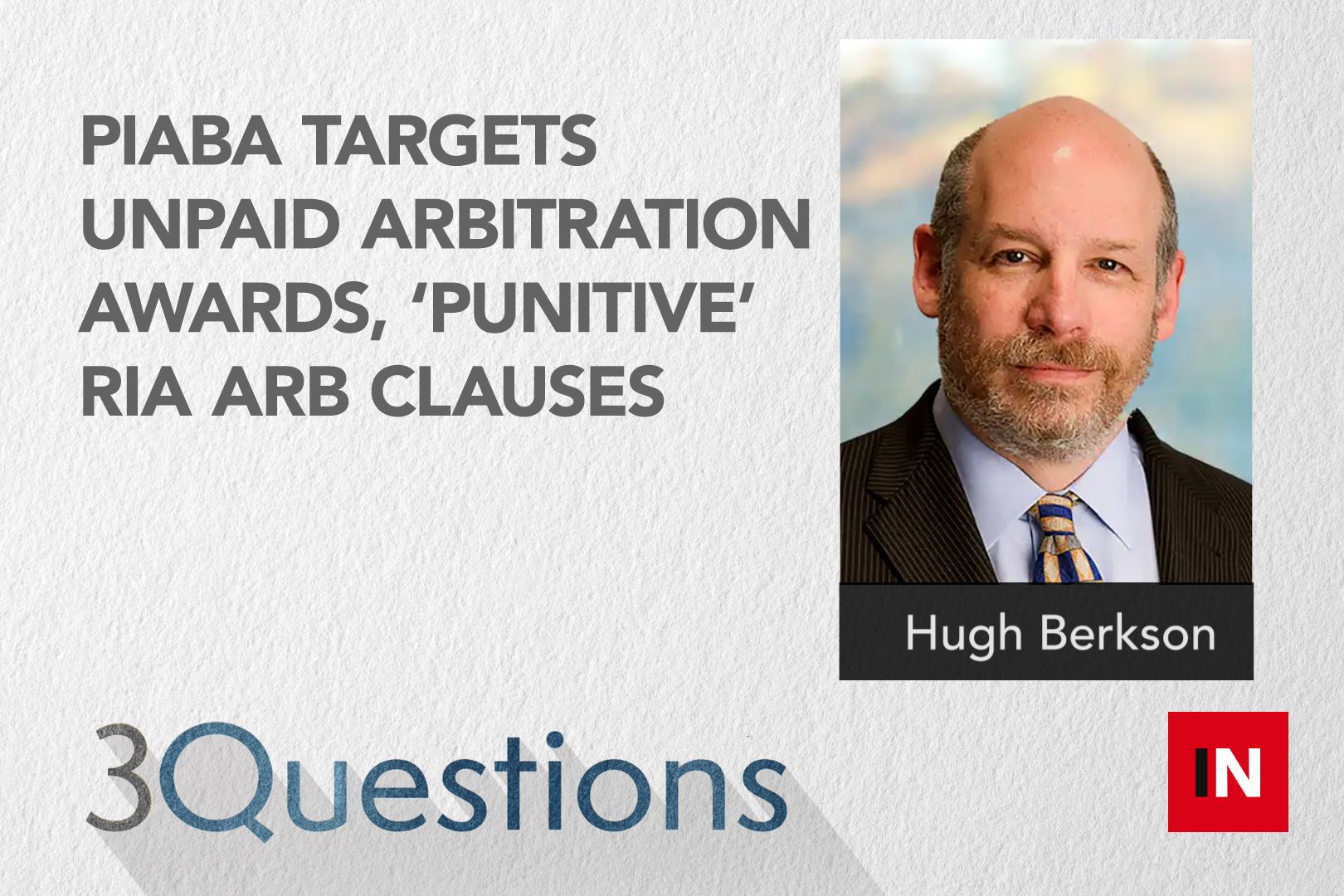Finra should retain remote supervision, says SIFMA’s Bentsen
Given the shift to remote and hybrid work that happened during Covid, Finra ought to make the remote supervision it introduced during the pandemic a permanent part of its rulebook, says SIFMA CEO Kenneth Bentsen Jr.
Mark Schoeff Jr. [00:00:04] Welcome to Three Questions, I’m Mark Chef Junior, a senior reporter at InvestmentNews. We’re talking today to Ken Bentsen Jr., president and chief executive of the Securities Industry and Financial Markets Association. One of the largest trade groups representing the financial industry. A former investment banker, Ken also knows Capitol Hill well, having served from 1995 to 2003 as a member of the House from Texas. Thank you again for joining us.
Ken Bentsen Jr. [00:00:33] Thank you for having me.
Mark Schoeff Jr. [00:00:35] This is sort of a twofer. Maybe we should call today’s segment four questions. It’s about regulation best interest. The broker standard of conduct Reg BI has been enforced for more than 20 months. How is it working and to what extent should the SEC define best interest and explain how to mitigate conflicts of interest?
Ken Bentsen Jr. [00:00:55] So, you know, our members have been reporting to us really over the past 20 months and beyond that the really the more that almost the last three years on the work that they’ve been doing to prepare and become compliant with Reg BI. And of course, as you know, that date occurred in the middle of a pandemic as well. So firms are having to do training, set up new policies and protocols, et cetera during that. But they endeavored to do so and, you know, committed a tremendous amount of capital and labor in order to be compliant and our members view it as a very, very stringent rule. And the SEC and FINRA have said that, you know, they intend to, you know, they’re already examining for it and they intend to fully fully enforce it. Many of our members made changes in their policies and procedures even before by going back to the old DOL fiduciary rule when it was still in place before it was struck down. And so a lot of those, not everybody, you know, a lot of people made changes didn’t change back. So what members, you know, tell us? I mean, they they think the rule is working. And obviously, we’re going through the examination period. We had the FINRA report that came out and said, you know, they identified certain areas firms should be watching for now. If you read that, you have to read that report very closely because they say, you know, some, not all in their data, it wasn’t that they were seeing widespread, widespread problems. The SEC has done examinations around, you know, a form series, you know, and they’re going to do more. So I think I think a lot of being done with respect to what should be defined the way that the SEC did, the rules around, you know, you know, best interest, conflict mitigation, all of the components of the rule where principle based. And we think that was a smart move because a lot of times if these are really determined by facts and circumstances on the individual instance or relationship that occurs and by the way, is, you know, you know, 40 act fiduciaries is not defined. It’s a principle based concept as well, which which I should also note virtually all of our members are both 40 act fiduciary and broker dealers, right? They offer both services. Client chooses what they want. So we think this is going to be an evolving issue out of that’s going to come out of examinations, maybe enforcement actions, guidance from from the commission and FINRA. But it will be. But we view it, as in our members, is a very, very stringent rule.
Mark Schoeff Jr. [00:03:31] A related investment advice rule is under the purview of the Department of Labor. Most of the Trump administration’s DOL fiduciary rule went into force on February one. We’re all waiting for the Biden DOL’s next iteration of the fiduciary rule, which likely would expand the definition of who is a fiduciary to retirement accounts. What are your concerns about the deal’s further work in this area?
Ken Bentsen Jr. [00:03:58] Well, first of all, as you know, firms are working to be compliant with what the, you know, the 2020 to 2020 02, I should say. You know, the advice party that Labor put out. So that’s a lot of work’s going in there. Second, again, going back to Reg BI, you know, we have to remember and again, I know, you know, this Reg BI applies to both qualified and non-qualified accounts, right? So it captures IRAS. It captures it captures for one case. And our view is that the department should really, you know, they’ve got twenty twenty two. They should they should stop there. And let’s see how Reg BI proceed. So let’s see how it evolves. You have again. Chair Gensler has said he intends to rigorously enforce the rule. We have every reason to believe that he will. And so we have a very strong rule in place making further changes, particularly just applying to one part. Just a qualified accounts would, in our view, create unnecessary if there’s unnecessary confusion at worst. You know, create a conflict and impact the the ability for people to get advice, particularly at the at the lower lower income level. So we think that the DOL should stop with what they have. Let’s let Reg BI grow and you know, let’s see how that works.
Mark Schoeff Jr. [00:05:25] It looks as if the as if a legacy of the pandemic is working from home. Summer has been leading an effort to extend regulatory relief, enabling remote office inspections for financial firms. What are the chances that remote supervision will become a permanent part of the federal rulebook?
Ken Bentsen Jr. [00:05:46] We think it should, and we think that and we’ve had discussions with FINRA, with the SEC, with the state regulators. You know, firms report to me, executives report to me that, you know, while people are coming back, we’re back at so many firms are back, but all but there are also many are going to be on hybrid schedules. Many are going to have some people working remote. And so we need to update the rulebook to what the what the work, you know, what the work place is going to look like in the post-pandemic world and that’s something we can’t control. We have to adjust for, as does FINRA. And I think FINRA is open to the idea. I think we have to work again with the SEC and NASAA on this, but it’s just a reality that you’re going to have hybrid working. So it can’t make sense that you’re going to have, you know, thousands of Office of Supervisory Jurisdiction. And firms also report to us that you know what they’ve found during this period, where offenders are granted release to with with respect to remote inspection that they haven’t seen any change. And frankly, so much inspection is really done today electronically as it is. We just think it’s time to really think about what the workplace of the future is going to look like and then design the rules to apply accordingly.
Mark Schoeff Jr. [00:07:02] Thank you again for your time today.
Ken Bentsen Jr. [00:07:05] Mark, thanks for having me.



